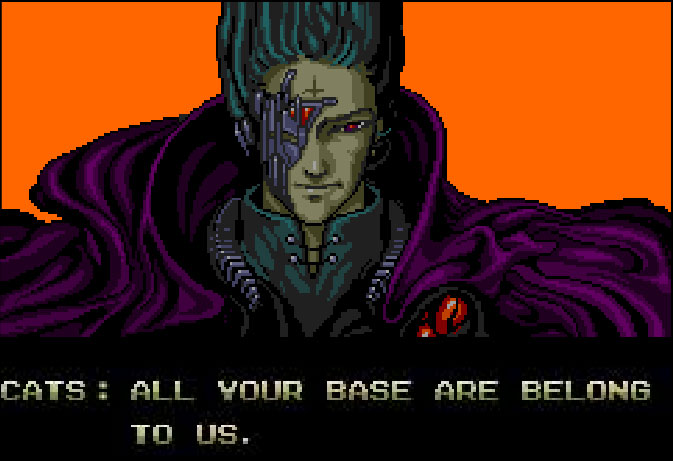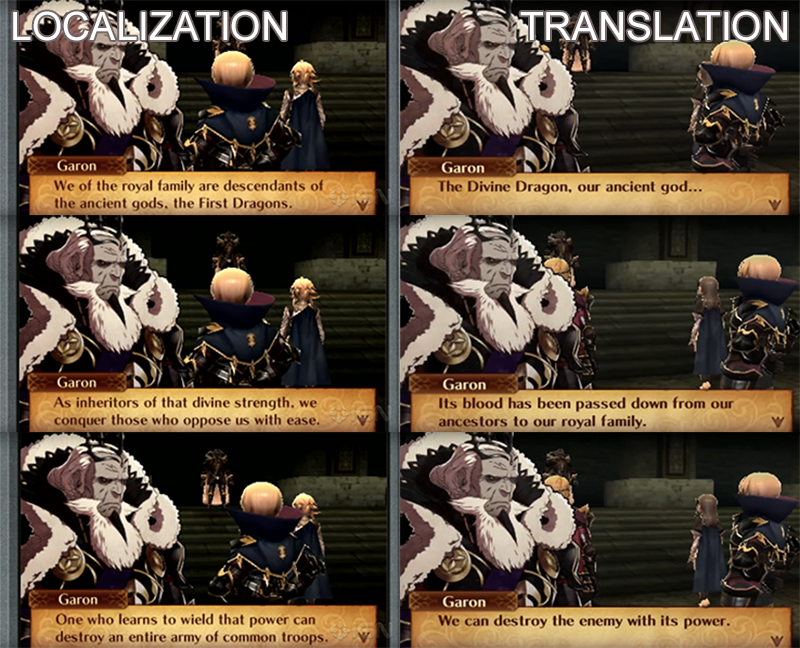Behind the Line: Localization is a Tricky Business

There’s been a strange, small but dark controversy broiling for the past while. A group of people have been very upset by the types of translations appearing in the localization of some games. This wouldn’t be so bad if this weren’t GamerGate lite, or part 2. In the case of Fire Emblem Fates, apparently some people feel the official release wasn’t “authentic” enough, and is an insult to the original Japanese version. Some people have been SO offended by this, that they’ve taken to personal attacks, and singling out scapegoats that they want fired. This reaction is absurd, embarrassing, and a reflection of some of the disturbingly juvenile trends in the game playing population. If, however, you want to dive into the madness, you can start here.
There are claims that the localization done was tantamount to censorship. I disagree with that claim, and won’t be addressing it here. I literally can’t follow the mental gymnastics used to elevate the offense. However, the particulars of localization are worth talking about, and this is a nice lead in to the topic.
Translating the words
The most obvious purpose of localization is to translate the words. This is something that when done well is not very noticeable, and when done poorly is… well…

Fortunately these days Google Translate alone can do a better job than this.
Sure, sometimes there are things that work better or worse. The more complex the story is the less likely that you can have an easy 1 to 1 translation from one language to another. Somewhere along the way, there will be a word of a phrase that doesn’t translate well. In those cases, the translator will have to do something to bridge the gap. Sometimes they can re-write things entirely to fit the narrative. However, if there are time or animation constraints then they may have to cheat a bit to lengthen, shorten, or otherwise re-time the sequence to fit the material. If you’ve watched old anime dubs, you’ll recognize the strange cadence the voice actors speak with as they try to match the time and animation of the scene. This is also why Team Four Star put so much extra editing work into DBZ Abridged, since they re-animate the lip flaps to match the delivery. This is all the literal translations, though, which assumes that the cultural context works. When it doesn’t, that’s when things get much more difficult.
Darmok and Jalad, at Tanagra/Shaka, When the Walls Fell
If you’ve seen the Star Trek: The Next Generation episode Darmok, you probably already understand what that header means. By extension you can understand what some of the difficulty in CULTURAL translation can be. If you haven’t seen the episode, the brief explanation is the Enterprise crew meet a species that speaks in metaphor. They have no trouble understanding the words they are saying, but because the crew does not understand the cultural context of the metaphors the other species is speaking with, they can’t understand the meaning of what is being said.
This is clearly a hyper exaggerated example, but the general premise is still present. Culture shapes language and the thoughts that are easily conveyed. Some cultures have unique iconography, and those are referred to in short hand in the language. Something may be intended to sound regal, but with the best translation of meaning in another language could sound plain or pedantic. This is why localization is more than just translation. Feelings, meanings, narrative weight, posturing, wordplay, all those things that can be conveyed underneath the actual vocabulary are based on the cultural context of the language. When faced with that problem, what do you put the emphasis on?
Fire Emblem Fates – Localization vs Translation
Let’s take a moment to formally define our terms.
- Translation – Modifying a work to change the words from one language to another.
- Localization – Modifying a work to make it more approachable or acceptable for a different customer base in a different region.
Back to the original example, Fire Emblem Fates’ translation had some players upset that it wasn’t true to the original script, or not authentic to the original work. One reaction to that was to make a fan translation. From a Kotaku piece on the topic, the left is the official localization, the right is the translation:
I haven’t played Fire Emblem Fates, so I can’t say what fits better, but it still shows how different the feeling can be with different wording. The localized text feels more grandiose or epic, where the localized text feels a bit more expository.
FLCL as another example
FLCL is a short anime series that has a reputation for being insanely wacky. It also is a HUGE cultural mash up. It contains a lot of references to very Japanese concepts. One example is a giant iron to smooth out the wrinkles on the landscape. This is a reference to a Japanese line of thought that the wrinkles in the brain are needed for thought. This reference is not something that translates well to a western audience as we don’t have that as a previously established concept. Another example is one episode that has sequences animated like South Park. Would the Japanese audience have been familiar with South Park? Would they have been confused as to why the animation got really strange for a few sequences? I don’t know myself, but it was a very western reference for a Japanese audience.
There was even one joke was more or less completely re-written in the dub of FLCL. Here is modified clip of it (the original didn’t play John Cena’s music):
This was Localized, where the translated subtitled version I first saw had a second row of subtitles explaining the original reference. For further context, the Toonami wiki entry for FLCL explains:
FLCL’s localization director (English translator) and script writer Marc Handler stated that localization of the script was the hardest part of the show. The in-jokes in the show included obscure pop culture references that had to be decoded and transferred to English audiences. One example was a reference to Cherio, a discontinued soft drink in Japan, for the English release the choice was made to use a discontinued American soft drink, Crystal Pepsi. Director Kazuya Tsuramaki responded to criticism of FLCL, stating “comprehension should not be an important factor in FLCL.”
As for the brain wrinkle thing, it gives us this:
The Medical Mechanica building featured in the town is a symbolic representation of the Japanese belief that the wrinkles of the brain allow thought and if you were to remove those wrinkles, the person would be devoid of thought. For English localization, the Japanese team had to explain the concept because a direct translation of script did not convey the ideology.
Pages: 1 2






![[PROTOTYPE]](http://www.enthusiacs.com/wp-content/uploads/2020/03/title-104x104.jpg)


First of all, I want to comment that it’s very rare that someone gives language the gravitas that it deserves. Even Kojima, who loves long-winded think pieces, belittled the power of language to little more than a plot device.
But enough about the Phantom Pain. I was always confused about the controversy surrounding FE:F. I always assumed I either missed a greater context, or I’ve simply been around much longer and thus remember what Nintendo sponsored censorship actually was.
Interesting you mention Kojima, as one of the big concepts in MGS 2 really didn’t translate from Japanese to English. “La Li Lu Le Lo” are sounds that don’t exist in Japanese, which is why there was the talk about information being hidden by removing letters from the alphabet. I commented in some depth about that on the MGS point streak comment section.
http://www.enthusiacs.com/point-streak-metal-gear-solid/
You know, I actually forgot about that. MGS2 has so much great stuff going on in it, including N unintentional commentary on the effects of localization. It’s a shame that MGS2 did more by accident than MGS5 ever could (but at least we’re not stuck “speaking a language of nukes!”)